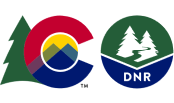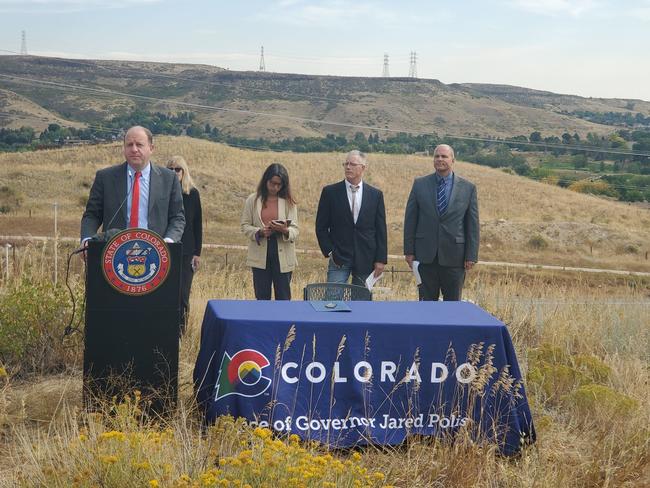GOLDEN — At an event in Golden Governor Polis, the Colorado Department of Natural Resources (DNR), in cooperation with the Department of Transportation (CDOT), released a report today detailing options to further protect Colorado’s wildlife habitat and wildlife corridors, and improve conditions for Colorado’s iconic big game species. The Governor also highlighted the state adding dedicated staff to work directly on this partnership, and support a comprehensive and collaborative approach between CDOT and DNR on the conservation of our wildlife and increased motorist safety.
The report, “Opportunities to Improve Sensitive Habitat and Movement Route Connectivity for Colorado’s Big Game Species,” was produced at the direction of Governor Jared Polis in a 2019 Executive Order (EO), which acknowledged that increased human activity compounds pressures on Colorado’s wildlife. The Governor’s Executive Order called on state agencies to expand collaboration and research, and propose potential strategies and policy solutions for alleviating habitat fragmentation and degradation.
The report highlights some of the challenges and threats facing Colorado’s wildlife which disrupt landscape connectivity and reduce the availability of functional habitat. These threats include roads and other infrastructure, industrial activities, residential growth, and outdoor recreation. Meanwhile, Colorado’s forest, sagebrush, and grassland ecosystems are already under strain from the impacts of climate change, wildfires, and persistent drought. As the climate changes, the habitats that wildlife rely on will change with it, and this report will help prioritize state policy, coordination and investment to support our wildlife and ecosystems best adapt to the changing climate.
“Coloradans care deeply about protecting and preserving our state’s wildlife ecosystem and improving driver safety. Colorado is using all available tools and funding options to preserve wildlife habitats by reducing wildlife and vehicle collisions, reducing traffic delays, and ensuring that human activities protect wildlife,” said Governor Jared Polis. “I appreciate the work of the Department of Natural Resources and the Department of Transportation and I look forward to working with the Colorado legislature, local, federal and Tribal governments and private landowners in implementing many of the policy priorities laid out in this report.”
The report examines a range of options to address these challenges, including implementing regulations for energy development and other land uses; improving infrastructure to reduce wildlife-vehicle collisions; coordinating conservation funding; planning trails with wildlife in mind; and better incentivizing participation by industry and private landowners in voluntary habitat conservation efforts.
In recognition of the report the Governor also issued a proclamation to officially acknowledge September 29, 2021 as “Wildlife Habitat and Connectivity Day,” underscoring the importance for Colorado to conserve habitat for big game and other native wildlife species and improve connectivity along the routes that wildlife use to migrate across the landscape.
“A key conclusion of the report is that, while there is no single intervention that can resolve the complex challenges affecting Colorado’s big game populations and their habitat, we do have the tools to ensure that these species can continue to thrive in our state,” said Dan Gibbs, Executive Director, Colorado Department of Natural Resource. “Recent efforts in the legislature, including the Colorado Parks and Wildlife’s Future Generations Act in 2018 and the Keep Colorado Wild Pass bill in 2021, will provide new funding sources and direction for Colorado’s wildlife and its habitat. Additionally, the state’s updated oil and gas regulations provide new tools and protections to balance energy development and wildlife needs. However, long term success will require a significant shift in priorities, and coordination across agencies, jurisdictions and sectors to provide the sustainable protection our big game species require.”
“Today’s report showcases how our state agencies can work together in a meaningful way to explore innovative solutions-- so that our programs can better respond to the evolving needs of Colorado residents and our big game wildlife populations,” said Dan Prenzlow, Director, Colorado Parks and Wildlife. “Our goals remain working through challenges such as habitat fragmentation, development demand, varied jurisdictions and much-needed funding to find opportunities to create cooperative solutions that help conserve our wildlife.”
CDOT Executive Director Shoshana Lew also recognized the need to improve transportation infrastructure that allows wildlife to safely cross highways and roads.
“Wildlife-vehicle collisions pose a risk to people and wildlife alike. An average of 3,300 these incidents are reported to CDOT every year, many of which result in injury to passengers and animal mortality, not to mention thousands of dollars in property damage. There is a significant need to increase funding for wildlife infrastructure, such as under- or overpasses, which we know can be highly effective at improving public safety and conditions for wildlife,” said Director Lew.
DNR and CDOT conducted extensive research and outreach, and examined approaches by other states in shaping the recommendations put forth in the report. A status update released by the Colorado Division of Parks and Wildlife (CPW) in 2020 and joint CDOT-CPW study also informed recommendations.
The Colorado Wildlife Federation, Hispanics Enjoying Camping and Hiking in the Outdoors, Teddy Roosevelt Conservation Partnership, National Wildlife Federation and other Coloradans and wildlife advocates participated in today’s event.
“Colorado’s wildlife community appreciates the Governor’s and First Gentleman’s leadership in elevating attention to this important issue,” added Colorado Wildlife Federation Director, Suzanne O’Neill. “We can and must work together to make progress before opportunities are lost.”
“Connected, healthy lands are critical for people, too, so it’s important to engage all Coloradans in finding solutions,” said HECHO Program Director, Bianca McGrath-Martinez.
###

